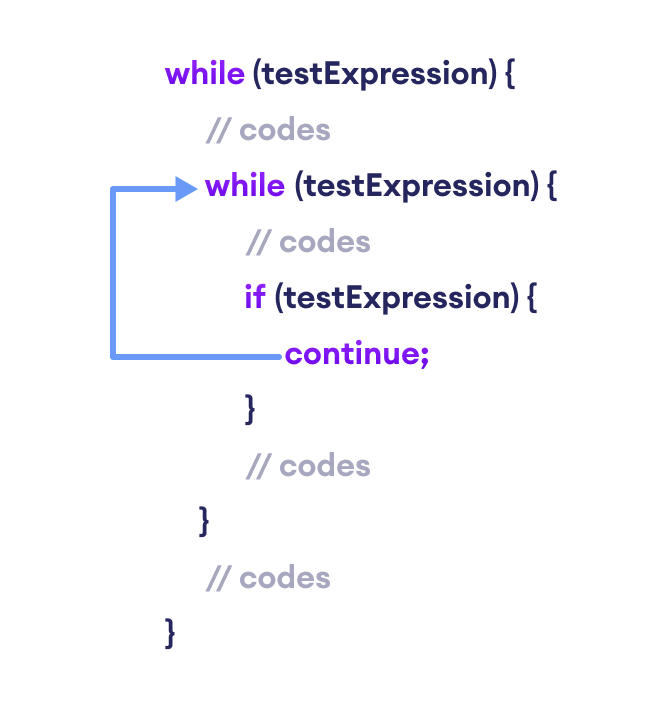Java Continue Yes or No Reddit
While working with loops, sometimes you might want to skip some statements or terminate the loop. In such cases, break and continue statements are used.
To learn about the break statement, visit Java break. Here, we will learn about the continue statement.
Java continue
The continue statement skips the current iteration of a loop (for, while, do...while, etc).
After the continue statement, the program moves to the end of the loop. And, test expression is evaluated (update statement is evaluated in case of the for loop).
Here's the syntax of the continue statement.
continue; Note: The continue statement is almost always used in decision-making statements (if...else Statement).
Working of Java continue statement

Example 1: Java continue statement
class Main { public static void main(String[] args) { // for loop for (int i = 1; i <= 10; ++i) { // if value of i is between 4 and 9 // continue is executed if (i > 4 && i < 9) { continue; } System.out.println(i); } } } Output:
1 2 3 4 9 10
In the above program, we are using the for loop to print the value of i in each iteration. To know how for loop works, visit Java for loop. Notice the statement,
if (i > 4 && i < 9) { continue; } Here, the continue statement is executed when the value of i becomes more than 4 and less than 9.
It then skips the print statement for those values. Hence, the output skips the values 5, 6, 7, and 8.
Example 2: Compute the sum of 5 positive numbers
import java.util.Scanner; class Main { public static void main(String[] args) { Double number, sum = 0.0; // create an object of Scanner Scanner input = new Scanner(System.in); for (int i = 1; i < 6; ++i) { System.out.print("Enter number " + i + " : "); // takes input from the user number = input.nextDouble(); // if number is negative // continue statement is executed if (number <= 0.0) { continue; } sum += number; } System.out.println("Sum = " + sum); input.close(); } } Output:
Enter number 1: 2.2 Enter number 2: 5.6 Enter number 3: 0 Enter number 4: -2.4 Enter number 5: -3 Sum = 7.8
In the above example, we have used the for loop to print the sum of 5 positive numbers. Notice the line,
if (number < 0.0) { continue; } Here, when the user enters a negative number, the continue statement is executed. This skips the current iteration of the loop and takes the program control to the update expression of the loop.
Note: To take input from the user, we have used the Scanner object. To learn more, visit Java Scanner.
Java continue with Nested Loop
In the case of nested loops in Java, the continue statement skips the current iteration of the innermost loop.

Example 3: continue with Nested Loop
class Main { public static void main(String[] args) { int i = 1, j = 1; // outer loop while (i <= 3) { System.out.println("Outer Loop: " + i); // inner loop while(j <= 3) { if(j == 2) { j++; continue; } System.out.println("Inner Loop: " + j); j++; } i++; } } } Output
Outer Loop: 1 Inner Loop: 1 Inner Loop: 3 Outer Loop: 2 Outer Loop: 3
In the above example, we have used the nested while loop. Note that we have used the continue statement inside the inner loop.
if(j == 2) { j++; continue: } Here, when the value of j is 2, the value of j is increased and the continue statement is executed.
This skips the iteration of the inner loop. Hence, the text Inner Loop: 2 is skipped from the output.
Labeled continue Statement
Till now, we have used the unlabeled continue statement. However, there is another form of continue statement in Java known as labeled continue.
It includes the label of the loop along with the continue keyword. For example,
continue label; Here, the continue statement skips the current iteration of the loop specified by label.

We can see that the label identifier specifies the outer loop. Notice the use of the continue inside the inner loop.
Here, the continue statement is skipping the current iteration of the labeled statement (i.e. outer loop). Then, the program control goes to the next iteration of the labeled statement.
Example 4: labeled continue Statement
class Main { public static void main(String[] args) { // outer loop is labeled as first first: for (int i = 1; i < 6; ++i) { // inner loop for (int j = 1; j < 5; ++j) { if (i == 3 || j == 2) // skips the current iteration of outer loop continue first; System.out.println("i = " + i + "; j = " + j); } } } } Output:
i = 1; j = 1 i = 2; j = 1 i = 4; j = 1 i = 5; j = 1
In the above example, the labeled continue statement is used to skip the current iteration of the loop labeled as first.
if (i==3 || j==2) continue first; Here, we can see the outermost for loop is labeled as first,
first: for (int i = 1; i < 6; ++i) {..} Hence, the iteration of the outer for loop is skipped if the value of i is 3 or the value of j is 2.
Note: The use of labeled continue is often discouraged as it makes your code hard to understand. If you are in a situation where you have to use labeled continue, refactor your code and try to solve it in a different way to make it more readable.
Source: https://www.programiz.com/java-programming/continue-statement
0 Response to "Java Continue Yes or No Reddit"
Post a Comment